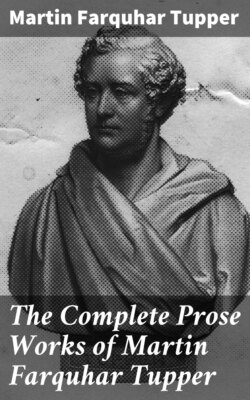Читать книгу The Complete Prose Works of Martin Farquhar Tupper - Martin Farquhar Tupper - Страница 76
На сайте Литреса книга снята с продажи.
PRISON COMFORTS.
ОглавлениеMany blessings, more than he had skill to count, had visited poor Acton in his cell. His gentle daughter Grace, sweet minister of good thoughts—she, like a loving angel, had been God's instrument of penitence and peace to him. He had come to himself again, in solitude, by nights, as a man awakened from a feverish dream; and the hallowing ministrations of her company by day had blest reflective solitude with sympathy and counsel.
Good-wife Mary, too, had been his comforting and cheering friend. Immediately the crock of gold had been taken from its ambush in the thatch, it seemed as if the chill which had frozen up her heart had been melted by a sudden thaw. Roger Acton was no longer the selfish prodigal, but the guiltless, persecuted penitent; her care was now to soothe his griefs, not to scold him for excesses; and indignation at the false and bloody charge made him appear a martyr in her eyes. As to his accuser, Jennings, Mary had indeed her own vague fancies and suspicions, but there being no evidence, nor even likelihood to support them, she did not dare to breathe a word; she might herself accuse him falsely. Ben, who alone could have thrown a light upon the matter, had always been comparatively a stranger at Hurstley; he was no native of the place, and had no ties there beyond wire and whip-cord: he would appear in that locality now and then in his eccentric orbit, like a comet, and, soon departing thence, would take away Tom as his tail; but even when there, he was mainly a night-prowler, seldom seen by day, and so little versed in village lore, so rarely mingling with its natives, that neither Jennings nor Burke knew one another by sight. His fame indeed was known, but not his person. At present, he and Tom were still fowling in some distant fens, nobody could tell where; so that Roger's only witness, who might have accounted for the crock and its finding, was as good as dead to him; to make Ben's absence more unusually prolonged, and his rëappearance quite incalculable, he had talked of going with his cargo of wild ducks "either to London or to Liverpool, he didn't rightly know which."
Nevertheless, Mary comforted her husband, and more especially herself, by the hope of his return as a saving witness; though it was always doubtful how far Burke's numerous peccadilloes against property would either find him at large, or authorize the poacher in walking straight before the judges. Still Ben's possible interposition was one source of hope and cheerful expectation. Then the good wife would leave her babes at home, safely in a neighbour's charge, and stay and sit many long hours with poor Roger, taking turns with Grace in talking to him tenderly, making little of home-troubles past, encouraging him to wear a stout heart, and filling him with gratitude for all her kindly care. Thus did she bless, and thus was made a blessing, through the loss and absence of that crock of gold.
For Roger himself, he had repented; bitterly and deeply, as became his headlong fall: no sweet luxuries of grief, no soothing sorrow, no chastened meditative melancholy—such mild penitence as this, he thought, could be but a soberer sort of joy for virgins, saints, and martyrs: no—he, bad man, was unworthy of those melting pleasures, and in sturdy self-revenge he flung them from him, choosing rather to feel overwhelmed with shame, contrition, and reproaches. A humbled man with a broken heart within him—such was our labourer, penitent in prison; and when he contrasted his peaceful, pure, and Christian course those forty years of poverty, with his blasphemous and infidel career for the one bad week of wealth, he had no patience with himself—only felt his fall the greater; and his judgment of his own guilt, with a natural exaggeration, went the length of saying—I am scarcely less guilty before God and man, than if, indeed, my hands were red with murder, and my casual finding had been robbery. He would make no strong appeals to the bar of justice, as an innocent condemned; not he—not he: innocent, indeed? his wicked, wicked courses—(an old man, too—gray-headed, with no young blood in him to excuse, no inexperience to extenuate), these deserved—did he say hanging? it was a harsher syllable—hell: and the contrite sinner gladly would have welcomed all the terrors of the gibbet, in hope to take full vengeance on himself for his wicked thirst for gold and all its bitter consequences.
